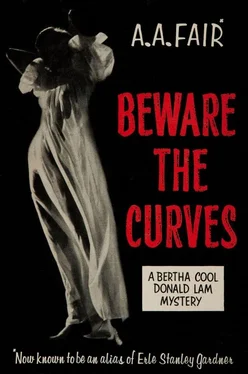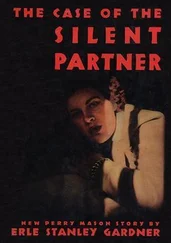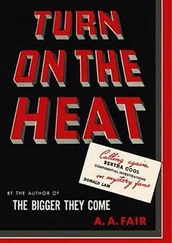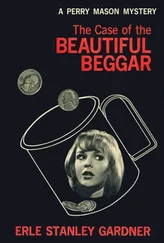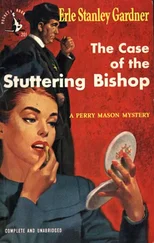Judge Lawton got mad. Mortimer Irvine got mad. The judge rebuked Barney for the manner in which he had made his objection. The judge rebuked Irvine for abusing the privilege of the opening statement. Then the judge sustained the objection.
Irvine didn’t do so good when he got mad. He lost some of his suave assurance. He had a savage, sarcastic streak in his character. The way I sized him up from that moment on he wasn’t a fighter. When the going got tough he didn’t wade in and slug. He circled around the edges and sniped.
Irvine went on. He said he expected to show that Ansel had returned from an expedition which he had voluntarily undertaken and for which he had received a bonus of twenty thousand dollars. He expected to show that within minutes of his arrival at the airport, Ansel had placed a telephone call. The telephone call had been to the residence of Karl Carver Endicott, but it had been a person-to-person call and the records would show that he had specifically stated he wished to talk only with Mrs. Endicott, and with no one else if she was not present.
Irvine went on to state that he expected to show Ansel had gone to the house. To the defendant’s surprise the person who had answered the door had been Karl Carver Endicott. Endicott had invited the defendant to an upstairs room. Within a matter of minutes thereafter Karl Carver Endicott had been dead, and Elizabeth Endicott had been a widow. Thereafter, Ansel had resorted to flight. He had remained in hiding, moving in the shadows, keeping from the clutches of the law only by reason of the fact that he was supposed to be dead. During that long waiting period, he had surreptitiously continued to meet Elizabeth Endicott.
Finally, when police had an inkling of the true facts, they had baited a trap and into that trap had walked the guilty pair — Elizabeth Endicott, the widow, who had been consorting with her husband’s murderer even before the body of her husband was cold in death, and John Dittmar Ansel, the defendant in the case, who had repaid the opportunities for advancement Karl Carver Endicott had given him by a .38 bullet fired into the back of Endicott’s head.
Irvine sat down amidst a hushed courtroom. One or two of the younger feminine members of the jury looked at John Dittmar Ansel with revulsion stamped all over their faces.
Court took the noon recess.
“He’s your baby,” I told Barney Quinn. “He can’t stand the in-fighting. It musses up his good looks. Get in there and play rough. Don’t let him get away with that stuff about betraying the interests of his employer. Make an opening statement of your own right after court convenes. Tell the jurors that Endicott deliberately sent Ansel on a suicide trip, that he baited his trap with twenty thousand dollars, but was so ruthless he didn’t even pay the twenty thousand in advance. It was only to be paid when the men returned, after having completed the impossible mission.”
“But a defense lawyer shouldn’t make his opening statement until he is ready to start putting on his case,” Quinn said.
“Then you may not have any case to put on,” I warned. “Right now you don’t dare to put the defendant on the stand, and before you get done you probably won’t dare to put Elizabeth Endicott on the stand. Tell them what you expect to prove, and pull out all the stops. Irvine talked about the loyalty due an employer from an employee. Tell them about the other side of the picture. Tell them about the man who sits smugly in an office and deliberately sends another man to his death, so that he can marry the man’s sweetheart.”
“The Court will rebuke me,” Quinn said.
“The Court rebuked Irvine,” I told him, “so you’ll be even. Get started!”
Quinn did a pretty fair job at that. Irvine got mad. He was on his feet, waving his hands, interrupting.
As the story began to unfold from Quinn’s lips, some of the women began to look sympathetically at John Ansel. Several of them glanced at Elizabeth Endicott and studied her poker face.
I made a note to remind Quinn to tell the jury that here was a woman who had suffered so much that she had abandoned tears as a useless expedient for emotional relief. Here was a woman who had had no outlet for her emotions for years, a woman who had suffered to the point of exhaustion.
Quinn began to get in his stride. He had more assurance and was showing some of the qualities that had given him a reputation as an up-and-coming trial lawyer.
By the time they started putting on evidence, most of the impression that Irvine had made on the jury with his opening argument had vanished. The jurors were interested and curious. They kept looking over the lawyers, the witnesses, the defendant, and above all Elizabeth Endicott.
After all, she was a public figure, the wealthy head of an oil empire, a mysterious woman who had kept to herself after the tragedy but who was now charged with having engaged in surreptitious meetings with a lover, a lover who in turn was hiding from the police.
The jurors prepared to enjoy all of the spicy details.
Irvine put on witnesses and went very briefly through the necessary preliminaries: the fact of death, a surveyor who introduced a diagram of the premises, a photographer who showed photographs, an autopsy surgeon who had made a post-mortem examination showing that Karl Carver Endicott had been killed by a .38 caliber bullet, which had been fired into the back of his head, a bullet which had almost protruded from the forehead of the dead man.
The slug had been recovered and was introduced in evidence. The shot had been fired from such a distance that there were no powder burns. It was the opinion of the witness that the shot had been fired “a matter of feet” from the deceased at a time when the decedent had his back turned to the murderer.
Mortimer Irvine looked at the clock, then said dramatically, “Call Helen Manning to the stand.”
Helen had dolled herself up. Aside from a few extra pounds, she was one good-looking babe and she knew it. You only needed one look at her as she got on the witness stand to know that the thing had worked in reverse. Instead of her dazzling Mortimer Irvine, he had turned loose his charm on her and had wrapped her around his finger.
She was like a well-trained dog on a leash doing exactly what was expected. She told her story in a low, throaty voice, that is, the story she wanted to tell.
She testified she had worked for Mr. Endicott for some years. She had finally decided to resign because the work was rather heavy for her, she wanted a change, and frankly there was a situation in the office that she didn’t want to bother Mr. Endicott with, but which made it unpleasant for her. She was a highly competent secretary. She could get a position anywhere, and she chose to leave Mr. Endicott’s employ. Mr. Endicott was very much concerned over her departure. He tried to find out what was wrong. He offered to make any adjustments that he could make, but she steadfastly refused to tell him why she was leaving because the young woman whom it was difficult for her to get along with was supporting a sick mother and needed the job. She wasn’t a very good secretary anyway, and would have had difficulty getting other employment, whereas Helen was thoroughly competent, well trained and could go out and get a job anywhere.
She had a letter signed by Mr. Endicott expressing his concern at losing her services, stating definitely that she was leaving of her own accord and recommending her very highly.
At about the time she was severing her connection with the office, she had “been told” that the defendant John Dittmar Ansel had been sent into the Brazilian jungle on a suicide expedition. She had, unfortunately, believed this story and communicated it to Mrs. Endicott.
Читать дальше
